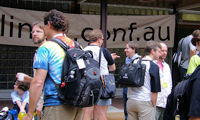28th Jan.

- Virtualization mini-conf
- Oracle VM
Shane Owenby
Oracle are now supporting their products on Oracle VM (Xen) Fixes to open code have been pushed upstream Have they done work on I/O issues? - How to build Virtualization Lan with Xen Technlogy
Tower Wan
Basic introduction to deploying Xen - Kernel Virtual Machine Security
Hadi Nahari  Open Virtual Machine Tools
Open Virtual Machine Tools
Eliot Lee, Ragavan Srinivasan (VMWare) This is on the VMware tools which is opened at SourceForge.- OpenQRM
Matthais Rechenburg
He introduced OpenQRM management tool which supports many virtualization technologies including Xen, qemu, KVM and VMware. - Virtualization – not just for big iron.
Ben Leslie (Open Kernel lab)
He introduced their microkernel (OKL4) which supports virtualization. Virtualization is also important on mobile devices GSM vs phone-book modules of a phone These situation involve a lot of inter-domain communication Micro-kernels can do this efficiency - Using Xen for Secure Isolation on ARM11 Based Mobile Devices or Yet
Jeah Pihet, George G. Davis (Montavista)
He discussed Xen ARM port. This port is fairly rudimentary There were many attempts in the past. Currently there are three ARM port: Samsung, university and Montavista. Samsung’s ARM port is complete but not openly released, but the other two are >publicly available. They successfully boots dom0 mini-os, but dom0 Linux or domU haven’t been worked on yet mainly because of lack of time. No dom0 linux (use minions for now MMU needs fixing They use arm domain functionality to protect guest kernel from the hypervisor. May have an ext tree on xen.org soon Likely at least a year to be merged
- Oracle VM
- Multimedia mini-conf
- Dirac Video Compression System
Anuradha Suraparaju, BBC Research
Designed for everything from cinema to web cams Will be first used in standard-res (not hdtv) production Also useful for archiving Uses wavelet transformations, which give softness which is visually more acceptable than blocking artifacts - Anatomy of a Video Codec
Timothy by Terriberry
Preview of a talk about Ogg Theora Similar to mpeg4, though the details differ Encoding / Decoding phases will be discussed in detail
- Dirac Video Compression System
 Embedded mini-conf
Embedded mini-conf
- Continuing Quietly: Another New Linux Device
Brett Nash
Fastboot, making a dynabook boot in 6.5s lilo (faster than grub), linux kernel, init, X11 Only compile in what you need Don’t probe – hardcode values Don’t print messages to console Use a minimal init / user space Most tiles is taken reading disk Mellow series of Intel CPUs have heat issues -> may well be EOLed
- Continuing Quietly: Another New Linux Device
29th Jan.
 Kernel mini-conf
Kernel mini-conf
At the end of the mini-conf, Linux Torvalds showed up.- Writing a PCI device driver using Qemu
Christoph Hellwig
Very basic but very funny. - How not to invent kernel interfaces
Arnd Bergmann
He discussed with the user about kernel interfaces: ioctl, procfs, sysfs. and talked about how they are bad. Current cool way is to utilize file system. However it requires more fs related codes. If codes already exist, following the existing way is the best. Otherwise it depends. Consider well. - Cache efficient Data structures
Joern Engel
RAM bandwidth increases, but latency does not decreases Link lists are the worst case Hashes are like arrays – they don’t work if you can’t predict your data size Radix trees turn out to be the best B-Trees are also good, but rebalancing is expensive - Enhancing Linux Graphics
Jesse Barnes
They discussed their efforts against X acceleration technologies: XAA, EXA, and showed other technologies: KXA. - Unix disk I/O scheduling
Joshua Root (UNSW)
He proposed their new I/O scheduler for their HPC and showed the benchmark results compared to other I/O schedulers.
- Writing a PCI device driver using Qemu
- Lightning talks
- Valarie Hanson
If applications could provide more information to the I/O layer, then it could make better scheduling decisions. Maybe. - Zac Brown
Preview of a presentation on the Coherent Remove File System Still very experimental – looking for developers Client-side cache makes it much faster than nfs Posix fs scementics aren’t sufficient to export themselves over a network. - Dave Miller
Network development roundup Support for NICs with multiple queues
- Valarie Hanson
- Kernel Developer Panel
- Matthew Garret, Dave Jones, Dave Airlie, Ben Herrenschmidt, Dave Miller
Module loading Blacklist? Should be done in user space – probably distribution dependant because of initramfs non-standardization Linking of distribution Buzillas and sharing of bugs would remove duplication of work – but correlating bugs would be a lot of work - Debate about kernel debuggers
- Matthew Garret, Dave Jones, Dave Airlie, Ben Herrenschmidt, Dave Miller

30th Jan.
- Keynote
- Bruce Schneier
- Reconceptualizing Security
- He talked about the difference feeling safe and real safety.
- Hardware/Software hacking: Joining Second Life to the Real World.
- Jonathan Oxer (President of Linux Australia)
- He introduced the related API which controls objects in Second Life and send controls from Second Life. Using those, it’s possible to synchronize real things in real world with object in Second Life.
- He showed an electrical fan activated with some very simple electrical gadgets when a object state in Second Life was changed.
- It was very fun to see really it worked.
- Fixing XFS Filesystems Faster
- Dave Chinner (SGI)
- He talked about xfs_repair optimization. They made xfs_repair much faster.
- The interesting part is that they worked on it with IRIX and other people also proposed an optimization with Linux.
- SGI’s first approach didn’t work well on Linux and other people’s approach didn’t work well with IRIX.
- So SGI analyzed both optimization and reached better result.
- Do Microkernels suck?
- Gernot Heiser (Open Kernel Lab)
- He introduced the benchmark results on Linux on L4 and native Linux.
- He was the teacher of Simon’s OS class.
- I wanted to listen the talk on KVM by Avi Kivity which was canceled.It was very disappointing. But the presentation at the 2007 KVM forum with the same title is available on line.
- X Acceleration That Finally Works.
- Carl Worth(RedHat), Eric Anholt
- They talked about X acceleration technologies: XAA, and KXA, and the recent GPU technology.
- For the recent GPU technology, the old X acceleration technologies aren’t effective. Or worse, they are slower than software implementation.
- So they have been developing EXA for Intel GPU.
- Penguin dinner
- This dinner took place in Victoria Market Melbourne, the largest open market in Australia

31th Jan.
- Keynote
- Stormy Peters
- Would you do it again for free?
- tutorial: Kernel hacking: hacking on lguest.
- Rusty Russel (IBM Linux technology Center)
- This was a real tutorial.
- Rusty gave some tasks which is easy to be done within 2 hours.
- The attendee wrote real patches and posted them to lguest development mailing list.
- NUMA pagecache replication
- Nick Piggin (SUSE Labs)
- He talked about NUMA pagecache replication.
- At first we reviewed what NUMA is, then went to page replication.
- He introduced the basic data structures which are used for replication and discussed the difficulties related to replication and collapses.
- It is under development status and his preliminary benchmark result showed about 10% improvement. But more benchmark is necessary.
- Chunkfs: fast filesystem check and repair
- Valerie Henson (VAH consultant)
- She overviewed the recent trend of hard drives and file systems.
- It motivated chunkfs whose design is derived by fast repair. She introduced the basic idea behind chunkfs.
- They implemented a prototype using ext2fs and showed demo.
- If I remember correctly, the chunkfs prototype was already opened more than one year ago. However no progress seems to be made.
- Linux on Sun Logical Domains
- David Miller
- He ported Linux to Sun Logical Domains (Sun’s hypervisor on SPARC).
- He introduced the hypervisor’s interfaces to the guest kernel and talked about his experiences on the porting and writing Linux virtual drivers.
- A day in the life of a distro kernel maintainer
- Dave Jones (RedHat)
- He is a maintainer of Fedora Kernel.
- After comparing Fedora kernel and RedHat kernel related to kernel patch sizes. And he introduced about his jobs.
1st Feb.
- Keynote
- Anthony Baxter.
- He introduced Python 2.6 and 3.0.,especially 3.0 incompatibilities and their transition strategies.
- Introducing the Coherent Remote File System
- Zach Brawn (Oracle)
- He introduced Coherent Remote File System.
- At first he showed the benchmark result with nfs which wasn’t able to utilized resources. That motivates crfs.
- He continued to crfs overview. Crfs uses btrfs.
- One feature of btrfs which was interesting for me is transactional write.
- crfs relies on it. The network protocol was followed.
- After 25 years, C/C++ understands Concurrency
- Paul McKenney (IBM)
- He talked about the concurrency extension for C/C++ as standard.
- As the introduction, he discussed on the concurrency access and various memory- ordering model. Especially Itanium and PPC,
- lguest64: a new breed of puppies
- Glauber Costa (RedHat)
- He talked about lguest64 internal implementation focused on the difference from lguest.
- The biggest difference comes from the fact that the segmentation can’t be used for protection. Xen also resolved same issue.
- Direct I/O on block device: scalability of I/O submission and processing paths
- Suresh Sinddha (Intel)
- He introduced I/O scalability issues.
- On SMP systems any CPUs may issue I/O, however I/O completion interrupts only single CPU. On NUMA systems things get worse.
- So discussed some approaches on it and some results (only relative improvement).
- Closing session
- The next Linux.conf.au will take place at Tasmania.




